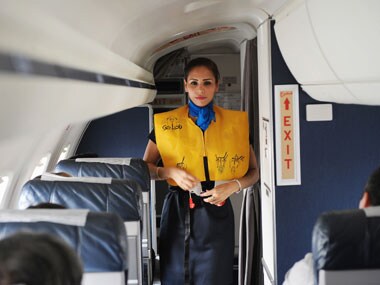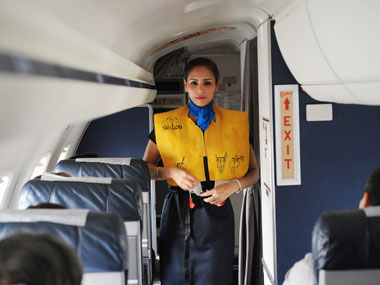New Delhi: India’s aviation regulator doesn’t care if cabin crew on our domestic flights are overweight.
In a much awaited draft regulation, the regulator has sought industry comments on whether to make it mandatory for cabin crew aspirants and existing crew members of airlines undergo a mandatory periodic health checkup. But a senior DGCA official told Firstpost the regulator is not concerned with “weight” issues of cabin crew and wants this very controversial subject to be handled by airlines themselves.
In a draft CAR (Civil Aviation Requirement) posted on its website today, DGCA has spoken of basic fitness tests for blood, urine, eyesight and lifestyle diseases besides height and body mass index (BMI). But has not specified what the height or weight requirements should be.
[caption id=“attachment_1017455” align=“alignleft” width=“380”]
 Reuters[/caption]
Reuters[/caption]
“Our purpose in issuing this CAR is to ensure that only medically fit cabin crew is recruited by airlines. But we are specifying things like weight - this must be dealt with as per company policy. We only want compliance as per International Civil Aviation Organisation (ICAO) standards on health parameters,” this official said requesting anonymity.
As of now, there are no mandatory health checkups needed for a prospective cabin crew applicant and none are mandatory for those already in service either. If DGCA’s draft CAR gets implemented, there will be mandatory checkups before joining and regular ones thereafter for call cabin crew members.
Impact Shorts
More ShortsA senior official at a legacy carrier pointed out that in the absence of mandatory checkups, cabin crew are frequently found unfit, suffering from serious lifetsyle diseases. He also said that the issue of excess weight can be resolved by grounding cabin crew for three months and then another three months. During this period, they continue to get some part of their salaries but not flying allowances.
That the weight of cabin crew is not just a contentious issue but one which is increasingly gaining importance is clear from the recent decision by low-cost airline GoAir to stop hiring male cabin crew members because they are obviously heavier than their female counterparts. This means an addition to the aircraft weight and therefore to the airline’s costs.
Airlines across the world are doing crazy things to cut down weight on the aircraft and save fuel but a ban on male pursers is surely a new chapter in this weight reduction saga! World over, most airlines prefer female cabin crew and are overwhelmingly tilted towards womenwhile recruiting for the cabin.
A former executive director with a legacy carrier said that the decision on whom to hire as cabin crew is the airline’s prerogative but eliminating male pursers is really not a practical idea. “There are umpteen number of things an airline can do to reduce weight. For example, it can reduce the weight of food and water that is carried on board, use lighter cutlery, uplift only as much fuel as is necessary depending on flight duration etc. GoAir uses Airbus 320 fleet which means it would have, on an average, four crew members per domestic flight. If even one of them is male, does it make such a huge difference to aircraft weight?”
An aviation industry veteran pointed out that tall crew members are helpful for passengers in opening overhead bins -which are usually placed quit high in the aircraft - and in assisting passengers in other functions as well. “Besides, if they gain weight, it shows less. And staying within weight limits also means the crew member is most likely free of any lifestyle disease,” this person said.
Air India cabin crew members may oppose the latest draft CAR despite it not specifying weight of cabin crew; AI has the maximum number of overweight cabin crew. “These mandatory health checkups are done in Europe and Australia but not in the USA since employee unions are very strong there. We need to bring a system where only healthy cabin crew is employed on flights,” an industry veteran said.
)